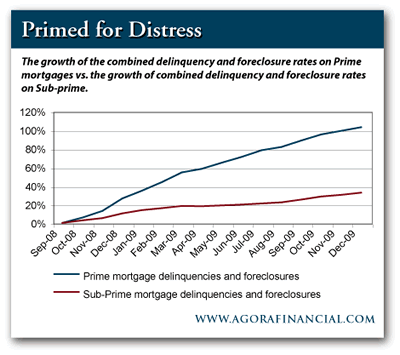It's true; the economy does manage to get out of bed every morning. Some folks applaud this fact and declare, "Aha! A recovery!" Other folks, like your California editor, observe that the economy usually crawls right back into bed after brushing its teeth. Your editor sees no recovery. He sees a coach potato with a very bright smile. He sees an economy that still lacks essential qualities like jobs, corporate revenue growth and credit.
The visible effects of this widespread malaise are...well...widespread. Let's take a peek at the housing stocks market of 2011, for example.
Home sales are improving somewhat at the low-end of the market, where government-subsidized financing remains available, and where the federal government has been offering tax incentives. But the high end of the stocks market still sticks.
"The latest existing-home sales data show transactions under $400,000 are 3% below year ago," observes economist David Rosenberg. "However sales of homes priced at $750,000 or more have declined a whopping 47%. Outside of FHA, Fannie Mae and Freddie Mac, mortgages that do not have government backing are still experiencing a credit crunch. 'Liars' who need jumbo mortgages must pay interest rates that are nearly 2 percentage points higher than conventional financing; as a result, the high-end sotcks market is not moving."
Rosenberg's observation is not entirely correct. The high-end market is definitely moving; it is moving down. This distress is not only a consequence of obvious trauma like job losses. The distress is also a result of "truth discovery" in the nation's liar loan portfolios.
- Discovery #1: People who lie about their financial health don't always make their mortgage payments.
- Discovery #2: Liar loans are not the only loans based on a fatal deception. Even many of the most honest loans from the bubble era contained this implied deception: People who WERE good credits will remain good credits.

As we mentioned last week, "FICO, the outfit that computes your vaunted 'credit score,' has just noticed that consumers with high scores are more likely to default on their mortgages than their credit cards. Last year, the firm says, folks with FICO scores of 760 or higher defaulted on real estate loans at three times the pace they defaulted on plastic.
"Earth to FICO," we continued, "If you're in an underwater home, why wouldn't you commit strategic default and use the difference between a mortgage payment and rent on a similar home to pay down those cards? You might not even have to move if your mortgage lender doesn't want to follow through on foreclosure and book the loss!
"Still, FICO's CEO told Bloomberg TV he's stunned the phenomenon isn't limited to subprime: 'Now we're starting to see at the high end of the marketplace people with good FICO scores having serious delinquency problems.'"
No comments:
Post a Comment